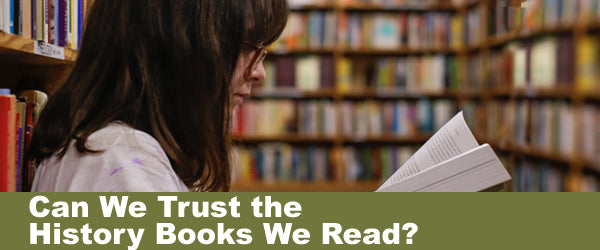
Posted by Amy Pak on
Can We Trust the History Books We Read?
THIS is a loaded question. First of all, know this. ALL history is written with a bias. Any author is going to bend, support, or omit information that will create a view or meet an agenda. At best, we can call it a “perspective”; at worst, “propaganda.” That said, when you read a work, just bear that in mind. It isn’t necessarily bad—it just causes us to read everything with a good dose of caveat lector (let the reader beware), recognizing that one particular piece is not always the end-all of information. Even the facts that are gathered for a historical writing are going to be from biased sources, no matter how neutral they appear. There has been a re-writing of history happening over the last century that has gutted much information, leaving potholes where there were once more particulars. Much of God’s providence has sadly been removed. At times, new knowledge can come to surface, sometimes clouding what might have been considered a main written source of cultural history, but often instead reinterpretation has taken place by secularist and humanist historians who exclude information purposefully, creating gaps in history—as if we could not be trusted to assess and draw conclusions for ourselves.
For example, when studying World War II several years ago, I went to the library to gather various books. Among them were a series by an author whose writings took place immediately after the war, having experienced it. The librarian did not like the author, and warned me not to include those, due to the heavy-handed propaganda at the time. Honestly, that made me want to get them all the more—not because I would agree with the author, but more because I wanted to understand the thought at the time. It helped fill in the picture better: the good, the bad, and the ugly.

A simple example much like “Telephone Game” took place many years ago, shortly after our “New World Explorers” Time Traveler was released. A woman wrote me insisting that that my information was wrong—sailors prevented scurvy from lemons, which had more vitamin C, NOT limes. When I asked of her source, it turns out that her grammar school teacher had told her that! Who knows where the woman’s teacher got her information; but it was enough to change the story and be passed on yet again. Not to mention, sailors had earned the nickname “limeys” for a reason! …And yes, lemons would later prove to have more vitamin C, but the sailors didn’t understand at the time why limes helped prevent the disease—they just did the job. Maybe they were just more available or perhaps lasted longer in storage. Long story short, be careful fully trusting in your sources—written or verbal. Stories can subtly change over time. It’s easy to be beguiled by latching onto the first thing we hear or read. OR, conversely, we may discover a new, “better” source that tempts us to completely discard a previous source.
Writings from the time may recall facts and experiences more aligned with the period, however they will still be written from a bias. Let’s take Flavius Josephus, a first-century Romano-Jewish historian known for capturing the history of Jewish interaction with Rome. Although having participated in and been an eyewitness to some of the history he wrote about, his writings were rather auto-biographical and at times a bit self-aggrandizing. They have also led to question his reliability due to the often-contradictory views found across his works. We can still glean information and details of the events, however we have to bear in mind that he had a story to tell—his way. It may not have been accurate or fair to all involved, especially because of a lack of other writings from that era or even the way works may have been written to meet the expectations of the readers of that time.
In summary, history has been recorded over centuries of time, and the stories have passed from hand to hand. Whether written more recently or having been experienced at the time, or even having been one’s own autobiography, everyone will have a bias. It’s important to educate ourselves beyond just trusting our initial reaction. Don’t hesitate to read from various reliable sources, but always keep in mind that there is no one perfect piece of written work (except for the Bible!). All authors have a lens they view the world through, and there are often more sides to the stories than we read. Consider the parable of the blind men and the elephant. None had ever come in contact with an elephant before, and each experienced a different part of the animal (such as the tail, the trunk, the ear), coming to his own conclusion. Had they been historians, they’d have written very different accounts of their encounter with the creature. Wouldn’t we be better served to read all of the accounts written to try to piece together what they experienced? Glean what we can and make wise decisions with the information we are given. Take advantage of these moments—they make wonderful opportunities for discussion with our kids!

I’m helping my son on an oral presentation he has to prepare for school on if we can trust history books. I’m so impressed with your comments on the Bible that I definitely am going to include it in the presentation.